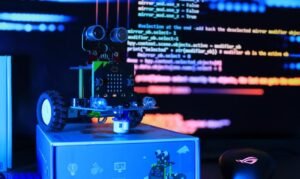What Is Open Source AI?
Artificial Intelligence (AI) has revolutionized various industries, from healthcare to finance, by automating complex tasks and enhancing decision-making capabilities. One aspect of AI that has gained significant traction is open source AI. Open source AI refers to AI software that is freely available for anyone to use, modify, and distribute.
Key Takeaways
- Open source AI refers to freely available AI software that can be used, modified, and distributed by anyone.
- Open source AI allows for collaboration and innovation by a diverse community of developers.
- Popular open source AI frameworks include TensorFlow, PyTorch, and scikit-learn.
Open source AI frameworks provide a foundation for developers to build their own AI applications. They offer pre-built tools and libraries that enable developers to create and train AI models, making it easier and more accessible for businesses and individuals to leverage AI technology.
One of the main advantages of open source AI is its collaborative and inclusive nature. Developers from around the world can contribute to the development of these frameworks, offering diverse perspectives and expertise. This fosters innovation and leads to the continuous improvement of AI technologies.
Commonly used open source AI frameworks include:
- TensorFlow: Developed by Google Brain, TensorFlow is widely used for building and training deep learning models.
- PyTorch: Developed by Facebook’s AI Research lab, PyTorch is known for its dynamic computational graphs and user-friendly interface.
- scikit-learn: A popular Python library for machine learning, scikit-learn provides a wide range of algorithms and tools for tasks such as classification, regression, and clustering.
Open Source AI vs. Proprietary AI
Unlike proprietary AI solutions, which are developed and owned by specific companies, open source AI offers greater transparency and flexibility. Users can examine the source code to understand how the AI model works and modify it to suit their specific needs. This level of transparency is particularly important in domains where the potential impact of AI decisions on individuals is high, such as healthcare and finance.
| Advantages | Description |
|---|---|
| Built-in community support | Open source AI frameworks have active communities offering support and guidance. |
| Cost-effective | Open source AI software eliminates licensing costs, making it more affordable. |
| Customizability | Users have the freedom to modify the AI software to meet their specific requirements. |
Table 1: Advantages of Open Source AI.
In addition to transparency and flexibility, open source AI also promotes innovation and knowledge sharing. By allowing developers to build on existing AI frameworks, it encourages the creation of advanced AI applications that can solve complex problems more efficiently. The collaborative nature of open source AI fosters the sharing of ideas and best practices, accelerating the overall progress of AI technology.
| Framework | Number of Contributors | GitHub Stars |
|---|---|---|
| TensorFlow | 2,500+ | 150,000+ |
| PyTorch | 1,000+ | 95,000+ |
Table 2: Open Source AI Statistics.
Open source AI is not without its challenges. One potential drawback is the lack of official technical support, as users mainly rely on community forums. Additionally, advancements in open source AI frameworks can be rapid, requiring developers to constantly keep up with new updates and changes.
Despite these challenges, the benefits of open source AI cannot be ignored. It democratizes access to AI technology, empowers developers to contribute to AI advancements, and promotes collaboration and innovation in the field.
Conclusion
Open source AI is transforming the way AI technology is created and utilized. It allows developers to leverage pre-built tools, collaborate with a global community, and customize AI software to meet specific needs. With its numerous advantages and potential for innovation, open source AI is set to play a major role in shaping the future of AI development and applications.

Common Misconceptions
Misconception 1: Open Source AI is only for tech experts
Many people mistakenly believe that Open Source AI is a field reserved only for highly skilled tech experts. However, this is not true. Open Source AI frameworks and tools are designed to be accessible to a wide range of users, including non-technical individuals. With the help of easy-to-use libraries and documentation, anyone with basic programming knowledge can start experimenting with and contributing to Open Source AI projects.
- Open Source AI provides beginner-friendly resources
- Tutorials and online communities support learning for non-experts
- The focus on user-friendly interfaces makes Open Source AI accessible to everyone
Misconception 2: Open Source AI means sacrificing quality
Some people believe that Open Source AI projects lack the quality and reliability found in proprietary AI solutions. However, this is a misconception. Open Source AI benefits from the collective efforts of a global community of developers, which often results in robust and high-quality software. The transparency and collaboration fostered by open source initiatives allow for extensive testing, reviews, and improvements, ensuring that the final product meets high standards.
- Open Source AI undergoes rigorous testing and peer reviews
- The transparent nature of open source projects encourages quality improvements
- Feedback and contributions from a diverse community lead to a high-quality end product
Misconception 3: Open Source AI is unregulated and insecure
There is a common misconception that Open Source AI is unregulated, resulting in potential security loopholes. However, the truth is that many open source projects have strict governance and security measures in place. The community-driven nature of Open Source AI promotes continuous security audits and updates to ensure the software remains secure and reliable. Additionally, being open source allows for more eyes on the code, making it easier to identify and fix vulnerabilities.
- Open Source AI projects have active security communities
- Regular security audits and updates minimize vulnerabilities
- The open nature of the codebase enables quick identification and resolution of security issues
Misconception 4: Open Source AI is not suitable for commercial applications
Many people believe that Open Source AI is solely for non-profit or hobbyist use. However, this is far from the truth. Open Source AI frameworks and tools are widely adopted in commercial applications as well. Companies leverage the flexibility and scalability offered by open source solutions to build custom AI systems tailored to their specific needs. Open Source AI empowers businesses to innovate and develop AI technologies without being tied to proprietary software.
- Open Source AI offers flexibility for customization in commercial applications
- Companies can build and optimize AI systems using open source software
- Cost savings and community support make Open Source AI attractive to businesses
Misconception 5: Open Source AI cannot compete with proprietary solutions
Another common misconception is that Open Source AI cannot compete with proprietary solutions offered by large tech companies. However, open source projects have demonstrated their ability to compete and even surpass closed-source alternatives in many areas. The collaborative nature of Open Source AI fosters rapid innovation, as a diverse community of developers constantly improves and expands the capabilities of the software. Many popular AI frameworks and tools, such as TensorFlow and PyTorch, have gained widespread recognition and are used by both individuals and major industry players.
- Open Source AI frameworks have gained mainstream adoption and recognition
- Rapid innovation through community collaboration keeps open source solutions competitive
- Open Source AI empowers individuals and organizations to build advanced AI models

What Is Open Source AI?
Open source AI refers to artificial intelligence software that is developed and distributed with an open-source license. This means that the source code of the software is available to the public, allowing developers to freely access, use, modify, and distribute the software. Open source AI projects encourage collaboration and collective intelligence, enabling a diverse community of developers to contribute to the advancement of AI technology. Here are ten fascinating facts about open source AI:
1. AI in Space Exploration
Open source AI has played a significant role in space exploration. For instance, the Mars Rover, a robotic vehicle for Mars exploration, utilized open source AI algorithms to analyze terrain and autonomously navigate through challenging environments.
2. Open Source AI Assistants
Open source AI assistants, such as Mycroft, provide an alternative to commercial voice-activated assistants. These platforms allow users to build their own customized AI assistants by utilizing open source code, enabling greater personalization and control over their data.
3. Open AI Research Platforms
Several organizations have developed open-source AI research platforms, like OpenAI’s Gym and DeepMind’s DeepMind Lab. These platforms provide researchers with standardized environments and tools to test and benchmark their AI algorithms.
4. Democratizing AI Education
Open source AI projects have contributed to democratizing AI education by providing accessible learning resources. Platforms like TensorFlow and PyTorch offer extensive documentation, tutorials, and educational materials, allowing aspiring AI practitioners to gain knowledge and skills.
5. AI for Medical Diagnosis
Open source AI has been used in the medical field for automated diagnosis and prediction of diseases. Projects like Caffe, an open source deep learning framework, have been employed to develop AI models that can assist doctors in analyzing medical images and detecting anomalies.
6. AI for Wildlife Conservation
Open source AI initiatives support wildlife conservation efforts. Projects like Wildbook utilize AI algorithms and computer vision to catalog and track animals in the wild, aiding researchers in understanding population dynamics and conservation planning.
7. Open Source AI Hardware
Open source AI extends beyond software developments. Open source hardware projects, such as OpenAI’s Neural Network Processing Units (NNPUs), provide designs and specifications for AI-specific hardware, fostering innovation and customization in the field of AI hardware development.
8. AI for Language Translation
Open source AI has contributed to language translation technology. Systems like OpenNMT offer pre-trained models and software frameworks that enable developers to build their own neural machine translation systems, improving multilingual communication and accessibility.
9. Open Data for AI
Open source AI benefits from open data initiatives. Platforms like Kaggle and UCI Machine Learning Repository provide vast collections of open datasets, allowing AI researchers and developers to access diverse data sources for training and evaluating their models.
10. Collaborative AI Ethics
The open source AI community actively engages in discussions about ethical considerations. Projects like the OpenAI Charter prioritize long-term safety, value alignment, and equitable distribution of benefits, ensuring that the development and deployment of AI are grounded in ethical principles.
Open source AI fuels innovation, collaboration, and accessibility in the field of artificial intelligence. With projects spanning various domains, from space exploration to wildlife conservation, open source AI democratizes knowledge, empowers developers, and advances technologies for the benefit of society.
Frequently Asked Questions
What is open source AI?
Open source AI refers to artificial intelligence (AI) technologies and frameworks that are made freely available to the public. It allows individuals, researchers, and developers to access, modify, and distribute source code related to AI algorithms, models, and tools. Open source AI promotes collaboration, transparency, and innovation in the field of artificial intelligence.
Why is open source AI important?
Open source AI is important because it fosters innovation and collaboration in the AI community. It allows researchers and developers to build upon existing AI technologies and customize them according to their specific needs. Open source AI also promotes transparency and helps democratize access to AI resources, making them freely available to anyone interested in AI research or applications.
Can anyone contribute to open source AI projects?
Yes, anyone can contribute to open source AI projects. Open source AI projects typically welcome contributions from the community, including code contributions, bug reports, feature suggestions, and documentation improvements. Contributing to open source AI projects is a great way to learn, collaborate, and make a positive impact on the AI community.
What are some popular open source AI frameworks?
Some popular open source AI frameworks include TensorFlow, PyTorch, Keras, scikit-learn, Theano, and Caffe. These frameworks provide a wide range of functionalities for developing and deploying AI models, and have active communities supporting their development and maintenance.
Where can I find open source AI projects?
You can find open source AI projects on popular code hosting platforms such as GitHub, GitLab, and Bitbucket. These platforms allow developers to host, share, and collaborate on open source projects. Additionally, many AI frameworks mentioned earlier have their own official websites and repositories where you can find their open source code and related projects.
Is open source AI safe to use in production environments?
Open source AI frameworks and libraries are generally safe to use in production environments. However, it is important to thoroughly test and validate the AI models and algorithms before deploying them. Additionally, keeping the frameworks up to date with the latest security patches is crucial to ensure the security of your AI systems.
What are the advantages of using open source AI?
Some advantages of using open source AI include:
- Access to cutting-edge AI technologies without high licensing costs
- Ability to customize and tailor AI algorithms to specific use cases
- Opportunity to collaborate with a vibrant AI community
- Transparency in understanding and inspecting AI models and algorithms
- Freedom to modify and improve AI frameworks to suit individual needs
Are there any limitations or challenges with open source AI?
While open source AI offers numerous benefits, there are also some limitations and challenges, such as:
- Limited support and documentation compared to proprietary AI solutions
- Potentially higher learning curve for new developers
- Dependency management and compatibility issues with different versions of AI frameworks
- Security concerns if not properly updated and maintained
How can I contribute to open source AI projects?
To contribute to open source AI projects, you can start by exploring their repositories, issues, and documentation. You can contribute code improvements, bug fixes, feature suggestions, or even help with documentation. Most projects have guidelines on how to contribute, and you can typically find them in the project’s repository or on their official website.
Can I use open source AI commercially?
Yes, you can use open source AI commercially. Open source licenses generally allow the use of the software and its modifications for commercial purposes. However, it is important to review the specific license of the open source project you intend to use to ensure compliance with its terms and conditions.




